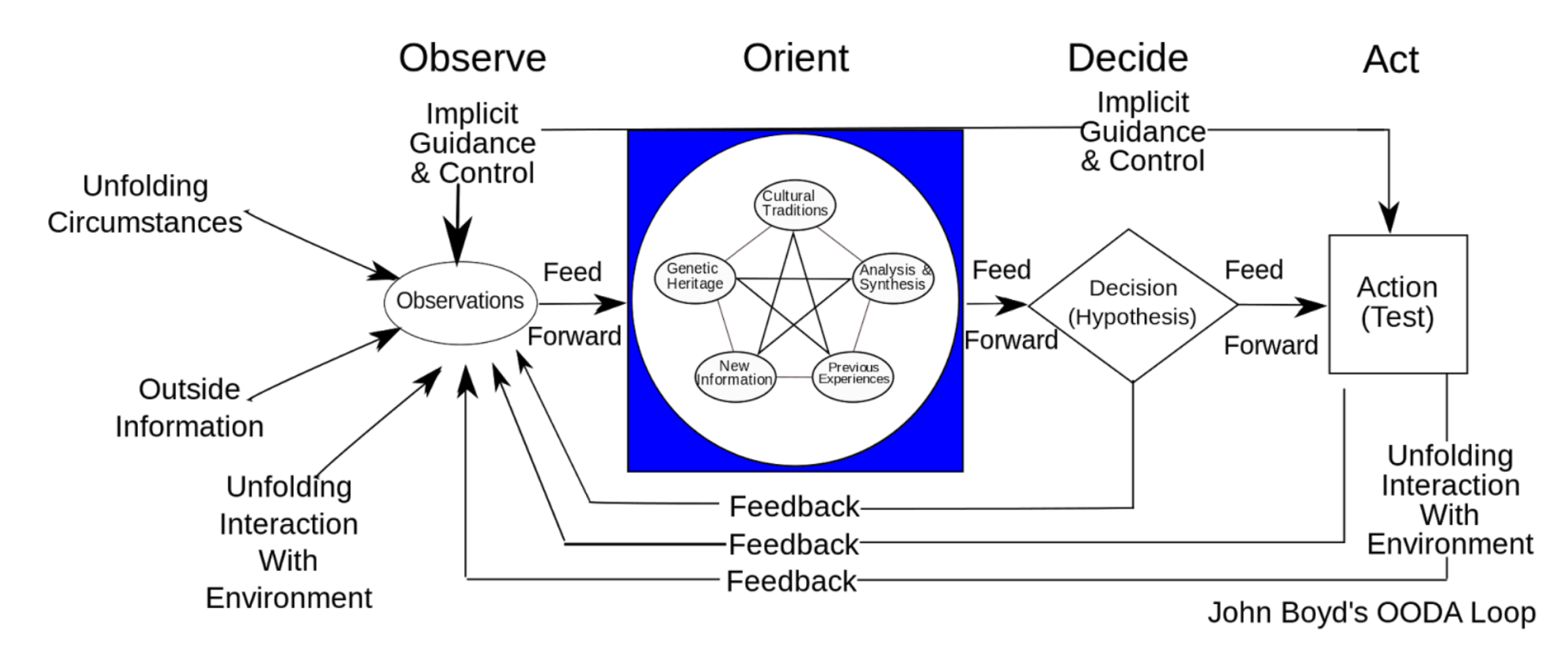OODA Loops Knowledge
Full credits to the work from Taylor Pearson https://taylorpearson.me/ooda-loop/ . Thanks for your great explanations of the OODA Loop and your ultimate guide.

OODA - Observe, Orient, Decide, Act
A model for individual and organizational learning and adaptation.
It is about the ability to rapidly change beliefs based on a rapid changing and uncertain environment. The shift to greater adaptability and speed is becoming required to survive in the business world.
OODA Loop Diagram

Observe
- Actively absorb the entire situation
- Include your own situation, opponents’ situations and the environment broadly.
- Physical, mental and moral dimensions.
- Looking at the emotional context, industry trends and competition’s move
- Observe the outside world and the result of previous actions
Orientation
- Understanding genetics, cultural heritage and previous experiences, then analyzing and synthesizing that with all observations
- Find mismatches; errors in previous judgements
- Bad news is the best kind because as long as you catch it in time, you can turn it to your advantage
Goal is to prove previous beliefs wrong by finding mismatches
Phase where creativity and innovation happens
Avoid trapping into confirmation bias: to look for information that confirms our beliefs
Create a more accurate model of reality with which to make better decisions and take better actions
- Via destruction (deductive) - having a bigger picture and breaking this picture down
- Take data from observation part and break that down and recombine through creative synthesis to form a new model of reality
- Via induction - start with particulars and build them up into a comprehensive whole
Be dilettante in your inputs but focussed in your output
Hunt your sacred cows … ideas, customs, or institutions that we hold to be above criticism, often unconsciously
Decide
Decide on adjusting strategy and roadmap and on next actions to take guides by the orientation phase.
Are you 70% sure about a decision? Make it and move on.
- Most decisions should probably be made with somewhere around 70% of the information you wish you had.
- Waiting for 90% and you’re probably too slow.
Become good at recognizing bad decisions fast. If you’re good at correcting fast, being wrong may be less costly than you think, whereas being slow is going to be expensive for sure.
Act
Carry out the decision
5 keys to OODA
- Orientation, Orientation, Orientation
- Destruction, Creation
- Include moral and mental dimension
- Understanding winning of hearts and minds
- So consider the existing culture
Get insight your adversary’s OODA loop
- Create mismatch of what the opponent is expecting you to do and build a trap of doubt, mistrust, confusion, disorder, fear, panic, chaos
- Reached via moving fast or frenetically, going through the cycles – fast transient .. ideal with abrupt, unexpected, disorienting changes that causes the other side to say “WTF”
- Understand that uncertainty and opportunity are linked.
- The reaction to try to eliminate uncertainty and close oneself off from uncertainty makes things worse on the long run
Stay open to people and source of information coming from diverse points of view How many significant beliefs have you changed your mind about last year? Reality is constantly changing … so we need to adapt our beliefs too.
Core Attributes
Einheit - Mutual Trust
Mutual trust among the team is of fundamental importance.
It is the result of
- Shared values … and assemble team based on shared core values
- Overcoming challenges together … confront and overcome complex and difficult situations together
Let’s one move more quickly. And reduces the overhead of micro-management.
Fingerspitzengefühl: Intuitive Skill
Recognize intuitive skill or intuitive knowledge. People who achieved mastery in a specific domain can skip the orientation phase because of their situational awareness and intuitive skill and knowledge.
Combined with Mutual Trust this keeps up the tempo and pressure.
Schwerpunkt:Focus
Focus on the main priority.
Having a clear focus and emphasizing that over any particular tactic, empowers your subordinates to make decisions for themselves in an uncertain environment. (whereas rigid procedures close you off and isolate you)
Given by objectives (and not by giving plans) and letting them figure out how to get there.
On Strategy
- Grand strategy - OODA loop of 4 years
- Strategy - OODA loop over the course of a quarterly plan
- Grand Tactics - some weeks
- Tactics - inner day and also far below
Observations and feedback should feedback up the chain.
Weekly review
- What am I anxious about?
- What was my progress? What did I get done?
- If I didn’t achieve what I set out to achieve … why not?
- What were the 3 worst things that happened? And what can I learn from each and do better next time?
- What were the 3 biggest wins? What did I learn from each and how can I double down on them?
Linking
- OODA Loops
- [[Military Strategy]]
- [[THE ART OF STRATEGY]]
- https://taylorpearson.me/ooda-loop/
- [[OODA LOOP - Taylor Pearson.pdf]]